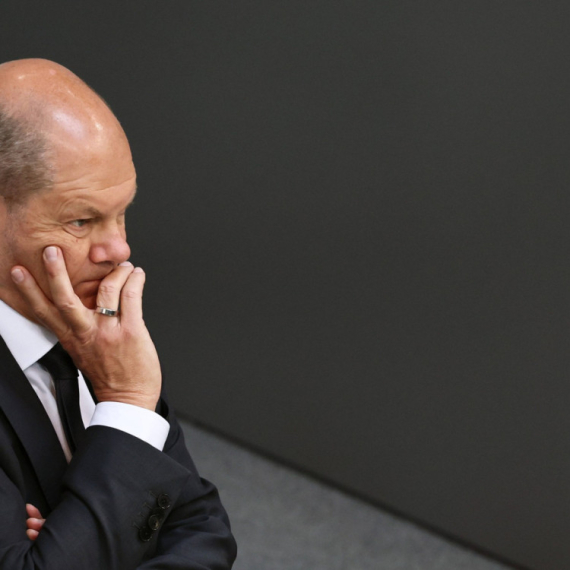Chinese activist Hu Jia jailed ahead of Olympics
Activist Hu Jia was on Thursday jailed for three years and six months for subversion, his lawyer said
Thursday, 03.04.2008.
11:32

Activist Hu Jia was on Thursday jailed for three years and six months for subversion, his lawyer said It comes amid what rights groups charge is a campaign by China to silence dissent before the Olympics. Chinese activist Hu Jia jailed ahead of Olympics The United States and the European Union immediately spoke out in defense of Hu, who became the second Chinese dissident in less than two weeks to be jailed after using the Beijing Olympics to highlight human rights problems in China. Hu, for many years one of China's highest-profile human rights campaigners, was found guilty at a Beijing court of "incitement to subvert state power" following a one-day trial last month, lawyer Li Fangping said. Li said the subversion charge had related to the 34-year-old Hu posting articles on the Internet about human rights issues and speaking with foreign reporters. "The evidence was publishing articles on websites outside of China and accepting interviews with the foreign press," Li said outside the court, adding he believed the verdict was unjust and he would advise his client to appeal. China's official Xinhua news agency carried a small article saying that Hu had confessed to his crime. "Hu spread malicious rumors and committed libel in an attempt to subvert the state's political power and socialist system," Xinhua said, citing the court verdict. Hu's wife, Zeng Jinyan, 24, who recently gave birth to their first child and is also a prominent rights activist, said the verdict was the culmination of four years of harassment by authorities. "He's been put under surveillance, been kidnapped. He's been put under house arrest and now they have sentenced him to three and a half years," Zeng told reporters outside the courthouse as she broke down in tears. "This is irrational and unfair." In one article he wrote with fellow activist and lawyer Teng Biao last year that was recently published by Human Rights Watch, Hu called on visitors coming to Beijing for the Olympics not to be fooled by the trappings of development. "You will see skyscrapers, spacious streets, modern stadiums and enthusiastic people. You will see the truth, but not the whole truth, just as you see only the tip of an iceberg," the pair wrote. "You may not know that the flowers, smiles, harmony and prosperity are built on a base of grievances, tears, imprisonment, torture and blood." Hu's verdict followed a jail sentence handed down on March 24 to Yang Chunlin, a former factory worker, on similar subversion charges. Yang, 52, was detained after he collected more than 10,000 signatures for a petition entitled: "We want human rights, not the Olympics". Rights groups have regularly criticized China's use of the subversion charge as a tool to silence anyone critical of the Communist Party, a campaign they have said has intensified ahead of the Games and highlighted by Hu's sentence. "This verdict is... a warning to any other activists in China who dare to raise human rights concerns publicly," said Mark Allison, East Asia researcher for Amnesty International. "It also betrays promises made by Chinese officials that human rights would improve in the run-up to the Olympics." The U.S. embassy spokeswoman in Beijing, Susan Stevenson, described the charge against Hu as "specious". "We are dismayed by this verdict," Stevenson told AFP. "In this Olympic year, we urge China to seize the opportunity to put its best face forward and take steps to improve its record on human rights and religious freedom." The European Union's spokesman in Beijing, William Fingleton, said Hu should never have gone on trial and called for him to be immediately released. Chinese Premier Wen Jiabao last month denied that Beijing was cracking down on dissidents ahead of the Olympics. "As for the critics' view that China is trying to increase its efforts to arrest dissidents before the Olympic Games, I think such accusations are totally unfounded. There is no such question at all," Wen said. Hu's verdict also came as China's communist rulers remained under international pressure over its handling of a crackdown on more than three weeks of unrest in Tibet.
Chinese activist Hu Jia jailed ahead of Olympics
The United States and the European Union immediately spoke out in defense of Hu, who became the second Chinese dissident in less than two weeks to be jailed after using the Beijing Olympics to highlight human rights problems in China.Hu, for many years one of China's highest-profile human rights campaigners, was found guilty at a Beijing court of "incitement to subvert state power" following a one-day trial last month, lawyer Li Fangping said.
Li said the subversion charge had related to the 34-year-old Hu posting articles on the Internet about human rights issues and speaking with foreign reporters.
"The evidence was publishing articles on websites outside of China and accepting interviews with the foreign press," Li said outside the court, adding he believed the verdict was unjust and he would advise his client to appeal.
China's official Xinhua news agency carried a small article saying that Hu had confessed to his crime.
"Hu spread malicious rumors and committed libel in an attempt to subvert the state's political power and socialist system," Xinhua said, citing the court verdict.
Hu's wife, Zeng Jinyan, 24, who recently gave birth to their first child and is also a prominent rights activist, said the verdict was the culmination of four years of harassment by authorities.
"He's been put under surveillance, been kidnapped. He's been put under house arrest and now they have sentenced him to three and a half years," Zeng told reporters outside the courthouse as she broke down in tears.
"This is irrational and unfair."
In one article he wrote with fellow activist and lawyer Teng Biao last year that was recently published by Human Rights Watch, Hu called on visitors coming to Beijing for the Olympics not to be fooled by the trappings of development.
"You will see skyscrapers, spacious streets, modern stadiums and enthusiastic people. You will see the truth, but not the whole truth, just as you see only the tip of an iceberg," the pair wrote.
"You may not know that the flowers, smiles, harmony and prosperity are built on a base of grievances, tears, imprisonment, torture and blood."
Hu's verdict followed a jail sentence handed down on March 24 to Yang Chunlin, a former factory worker, on similar subversion charges.
Yang, 52, was detained after he collected more than 10,000 signatures for a petition entitled: "We want human rights, not the Olympics".
Rights groups have regularly criticized China's use of the subversion charge as a tool to silence anyone critical of the Communist Party, a campaign they have said has intensified ahead of the Games and highlighted by Hu's sentence.
"This verdict is... a warning to any other activists in China who dare to raise human rights concerns publicly," said Mark Allison, East Asia researcher for Amnesty International.
"It also betrays promises made by Chinese officials that human rights would improve in the run-up to the Olympics."
The U.S. embassy spokeswoman in Beijing, Susan Stevenson, described the charge against Hu as "specious".
"We are dismayed by this verdict," Stevenson told AFP.
"In this Olympic year, we urge China to seize the opportunity to put its best face forward and take steps to improve its record on human rights and religious freedom."
The European Union's spokesman in Beijing, William Fingleton, said Hu should never have gone on trial and called for him to be immediately released.
Chinese Premier Wen Jiabao last month denied that Beijing was cracking down on dissidents ahead of the Olympics.
"As for the critics' view that China is trying to increase its efforts to arrest dissidents before the Olympic Games, I think such accusations are totally unfounded. There is no such question at all," Wen said.
Hu's verdict also came as China's communist rulers remained under international pressure over its handling of a crackdown on more than three weeks of unrest in Tibet.













































Komentari 1
Pogledaj komentare